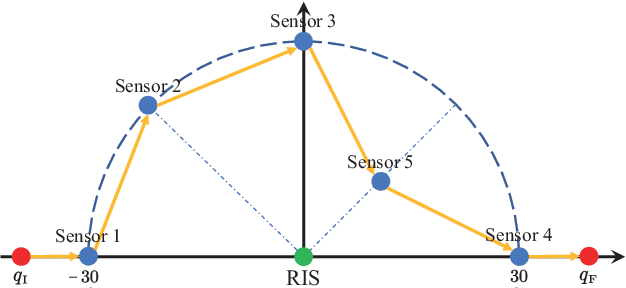Energy Minimization in RIS-Assisted UAV-Enabled Wireless Power Transfer Systems
Paper and Code
Aug 18, 2022



Unmanned aerial vehicle (UAV)-enabled wireless power transfer (WPT) systems offer significant advantages in coverage and deployment flexibility, but suffer from endurance limitations due to the limited onboard energy. This paper proposes to improve the energy efficiency of UAV-enabled WPT systems with multiple ground sensors by utilizing reconfigurable intelligent surface (RIS). Specifically, the total energy consumption of the UAV is minimized, while meeting the energy requirement of each sensor. Firstly, we consider a fly-hover-broadcast (FHB) protocol, in which the UAV radiates radio frequency (RF) signals only at several hovering locations. The energy minimization problem is formulated to jointly optimize the UAV's trajectory, hovering time and the RIS's reflection coefficients. To solve this complex non-convex problem, we propose an efficient algorithm. Specifically, the successive convex approximation (SCA) framework is adopted to jointly optimize the UAV's trajectory and hovering time, in which a minorization-maximization (MM) algorithm that maximizes the minimum charged energy of all sensors is provided to update the reflection coefficients. Then, we investigate the general scenario in which the RF signals are radiated during the flight, aiming to minimize the total energy consumption of the UAV by jointly optimizing the UAV's trajectory, flight time and the RIS's reflection coefficients. By applying the path discretization (PD) protocol, the optimization problem is formulated with a finite number of variables. A high-quality solution for this more challenging problem is obtained. Finally, our simulation results demonstrate the effectiveness of the proposed algorithm and the benefits of RIS in energy saving.
 Add to Chrome
Add to Chrome Add to Firefox
Add to Firefox Add to Edge
Add to Edge